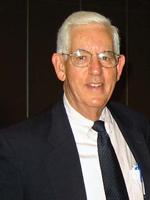
APPALACHIA: A History of Mountains and People
Introduced by the filmmakers Jamie Ross and Ross Spears
Participants
There were several members of the University of Tennesse faculty that played a role in the film. Below is a listing of some of those individuals. For a complete listing of participants, CLICK HERE.
Robert Hatcher
 Hatcher is a distinguished scientist and professor of earth and planetary science. His primary research interests are the evolution of continental crust, mountains and large faults.
Hatcher is a distinguished scientist and professor of earth and planetary science. His primary research interests are the evolution of continental crust, mountains and large faults.
Hatcher received a bachelor's degree and a master's degree from Vanderbilt University and a doctorate from UT Knoxville. He worked for an oil company and served on the faculties of Clemson University, Florida State University and the University of South Carolina before coming to UT Knoxville as a research scientist and faculty member in 1986. He also worked as a researcher for the Oak Ridge National Laboratory until 2000. He is the only UT/ORNL distinguished scientist with a degree from UT. He is the author or editor of nine books and more than 150 refereed publications. In addition to numerous other awards, in 1998 he was named an honorary citizen of West Virginia for his long-term contributions to training geologists and to Appalachian geology. In 2006 Hatcher was awarded the Geological Society of America Penrose Medal, recognizing his research contributions in tectonics and Appalachian geology, and the American Geological Institute Ian Campbell Medal, recognizing his contributions to geoscience research, education, professional service and science management. He has received more than $5 million in research funding.
Jeff Chapman
Chapman is research associate professor in the Department of Anthropology and director of the McClung Museum.
He received a bachelor's degree from Yale University and a master's degree from Brown University. He taught history and anthropology at the Webb School of Knoxville for six years before returning to graduate school. After receiving a master's degree and doctorate from the University of North Carolina, Chapel Hill, he joined the faculty at UT Knoxville. Chapman has had more than 40 years of archaeological experience in Tennessee and has authored numerous articles and books. Additionally, he has designed and researched a number of museum exhibits.
Below are four exhibits that are related to the film:
- Archaeology and the Native Peoples of Tennessee
- Geology and the Fossil History of Tennessee
- Treasures Past and Present: Freshwater Mussels
- The Battle of Fort Sanders, November 29, 1863
Don Byerly
A professor emeritus in the Department of Earth and Planetary Sciences at UT Knoxville, Byerly is one of the country's leading geologists in the study of the Appalachian Mountains. Byerly taught at UT Knoxville for 43 years before retiring in 2000.
He received his bachelor's degree from the College of Wooster and a master's degree and doctorate from UT Knoxville. He has published numerous papers and reports dealing principally with engineering and environmental geology.
Paul and Hazel Delcourt
The Delcourts are retired as professors of Ecology and Evolutionary Biology at the University of Tennessee. Hazel Delcourt is the author of Reading Landscapes of the Past. Both are co-authors of Prehistoric Native Americans and Ecological Change.
Wilma Dykeman
The late Wilma Dykeman was a novelist and nonfiction writer who taught literature at UT Knoxville. She wrote on a wide variety of subjects involving the culture and people of Appalachia.
Dykeman was born in Asheville, N.C., and lived all her life near the French Broad River in the mountains of North Carolina and Tennessee. She attended Biltmore Junior College in Asheville and then earned her bachelor's degree in speech at Northwestern University.
She married poet and writer James R. Stokely Jr. of Newport, Tenn., and together they wrote several books, including "Neither Black Nor White" (1957), a personal view of Southern integration; "Seeds of Southern Change" (1976), about race relations; and "Prophet of Plenty" (1966), a biography of W.D. Weatherford, a Southern leader who worked for racial peace and justice. Stokely died in 1977.
Dykeman's other work ranged from radio scripts to short stories to articles published in Harper's, the New York Times Magazine, Reader's Digest and other periodicals. In all, she published more than 16 books, including "The French Broad" (1955), "The Tall Woman" (1966), "The Far Family" (1966), "Return the Innocent Earth" (1973), "Look to This Day" (1969) and "Tennessee: A Bicentennial History."
Dykeman was the honorary Tennessee State Historian from 1981 until she died in 2006.
James Fellenbaum
 Fellenbaum is director of orchestras at the University of Tennessee and resident conductor of the Knoxville Symphony Orchestra. He directed the UT Chamber Orchestra as it performed the classical underscore for the film.
Fellenbaum is director of orchestras at the University of Tennessee and resident conductor of the Knoxville Symphony Orchestra. He directed the UT Chamber Orchestra as it performed the classical underscore for the film.
Fellenbaum is in his sixth year at UT, and his extensively diverse background as a conductor has found him collaborating with some of the world's great artists and orchestras. In May 2006, Fellenbaum was invited to the First International Gennady Rozhdestvensky Conductors Competition, where he was a Top 5 finalist out of 112 conductors from 26 countries around the world. He has conducted orchestral and operatic concerts nationally and internationally and participated as an academy conductor in the American Academy of Conducting during the 2002 Aspen Summer Music Festival.
Fellenbaum has a bachelor's degree in violoncello performance from James Madison University in Virginia and has double master's degrees in violoncello performance and orchestral conducting from Northwestern University.
Funded by a major grant from
the National Science Foundation
Additional funding provided by
the Arthur Vining Davis Foundatons
National Endowment for the Humanities
Southern Humanities Media Fund
Cherokee
Preservation Foundation
Appalachian
Regional Commission
Tennessee Arts Commission
further funding by the Humanites Councils of
Tennessee
Virginia
North Carolina
South Carolina
West Virginia
Pennsylvania.


